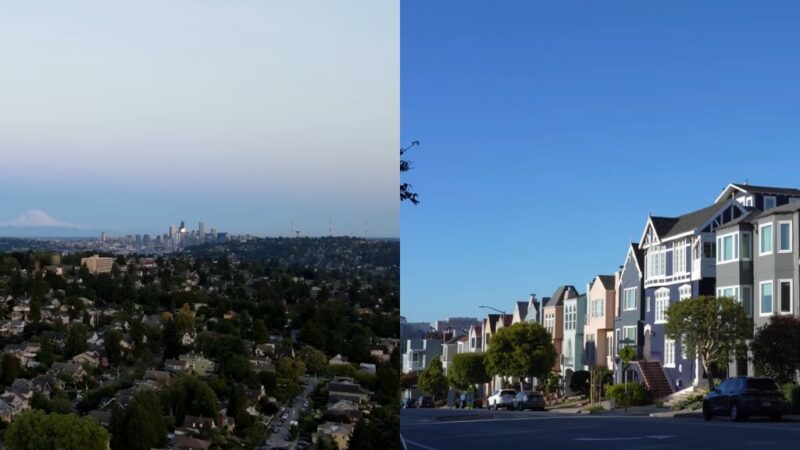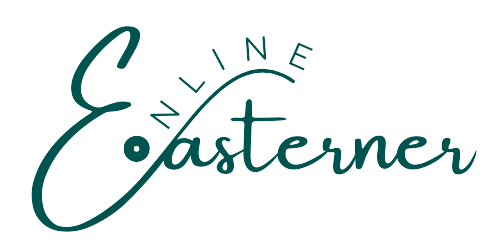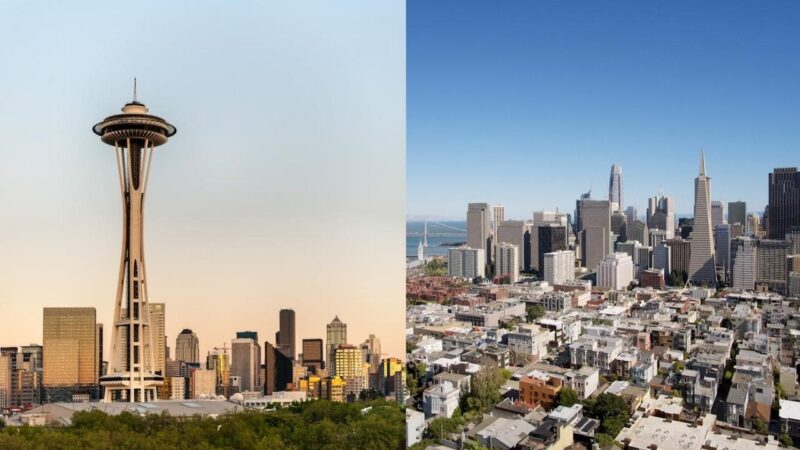Starting a business in 2025 means weighing not just ideas and markets, but geography itself. Where a founder sets up shop still matters deeply for access to capital, talent, and quality of life. Few comparisons capture that tension better than Seattle versus San Francisco.
Both cities rank among the strongest startup ecosystems on the planet, yet they reflect different paths to building a company: one defined by scale and density, the other by focus and sustainability.
Here’s a look at the tradeoffs founders actually face between the two.
Key Takeaways
- San Francisco dominates global venture funding, especially in AI and fintech, while Seattle leads in cloud infrastructure, logistics, and enterprise software.
- Seattle offers lower living and operating costs, with no state corporate tax but a B&O tax on revenue; San Francisco has higher costs and layered taxes.
- The Bay Area provides unmatched investor density and rapid funding access, whereas Seattle balances strong talent and livability with slower capital flow.
- San Francisco suits high-growth AI startups; Seattle fits sustainable, engineering-focused ventures or hybrid teams splitting operations between both cities.
Two Heavyweight Startup Ecosystems
On nearly every major startup index, the San Francisco Bay Area leads the world. StartupBlink ranks it as the number one ecosystem globally, thanks to its unmatched density of startups, venture firms, and exits.
Seattle also performs strongly, placing within the top handful of U.S. hubs and around 20th globally in the 2024 Startup Genome Report.
Even with its slightly lower rank, Seattle remains one of America’s top five startup metros, often appearing just behind the Bay Area, New York, and Boston. Both cities have global reputations for producing billion-dollar companies, though the types of businesses that thrive differ.
Sector Strengths

Each city’s startup scene has carved out its own specialties, shaped by local talent and industry roots.
The sectors they dominate reveal how founders can best align their business with each ecosystem’s natural strengths.
San Francisco / Bay Area
According to Avison Young:
- Core focus areas: AI, fintech, crypto, dev tools, consumer tech, and enterprise SaaS
- In the first half of 2025, AI startups alone raised about $74.6 billion, three times the amount a year earlier
- Over half of all U.S. venture funding flows through the Bay Area
Seattle
GeekWire reports the following:
- Specialties: cloud infrastructure, logistics, aerospace, gaming, and applied AI
- Ranked sixth among U.S. metros for total startup funding, with $3.46 billion raised over a recent 12-month span
In practical terms, San Francisco offers greater scale, while Seattle centers around deep engineering talent and technical industries.
Cost of Living and Operating Costs
Both cities are expensive, but the degree of cost pressure varies by category.
Housing and Daily Life

Multiple sources show San Francisco remains pricier overall, though the margin has narrowed. A Redfin comparison places the Bay Area about 13% more expensive than Seattle, largely due to housing.
According to Numbeo, a typical house costs around $900,000 in Seattle compared to roughly $1.49 million in San Francisco, while average monthly rent for a one-bedroom runs about $3,057 in Seattle versus $3,814 in San Francisco.
For broader perspective, King County’s median home price sits near $811,000, already far above the national median.
Meanwhile, Silicon Valley’s median price hovers around $1.9 million, requiring income levels that simply exclude most first-time founders, as per LeMonde.
Cost Overview
| Category | Seattle (Metro) | San Francisco / Bay Area (Metro) | Practical Takeaway |
| Typical home price | ~$811K | ~$1.3–1.9M | SF requires far higher capital and income |
| One-bedroom rent | ~$3,000 | ~$3,800 | Payroll and founder draw must adjust upward |
| Cost of living | 40–50% above U.S. average | ~13% higher than Seattle | A given salary buys less in SF |
Both cities have seen rent increases driven by AI hiring and high-earning tech workers. For founders, baseline burn is simply lower in Seattle, especially around office space and housing, though both are high by national standards.
Taxes and Ongoing Obligations
Taxes reveal some of the clearest structural differences.
California (San Francisco)
According to the State of California’s Franchise Tax Board:
- Corporate income tax: 8.84% (10.84% for financials)
- Minimum franchise tax: $800 annually, even with zero profit
- Sales tax: 7.25% state rate; around 8.5–9.5% combined in San Francisco
The city also adds its own gross receipts and industry-specific levies, particularly for tech and financial firms. Together, those layers make for a complex but predictable tax regime once profits begin.
Washington (Seattle)
- No state corporate income tax (per TaxValet)
- Instead: a Business & Occupation (B&O) tax on gross receipts, which applies regardless of profit
- Seattle adds a city-level B&O tax, though proposals such as Proposition 2 would exempt smaller firms under $2 million in revenue
Even without a corporate tax, total business tax burden in Washington runs about 18.8% above the national average, meaning the advantage is relative, not absolute.
Tax Tradeoff Summary
| Factor | Seattle | San Francisco |
| State corporate tax | None | 8.84% |
| Tax on revenue | Yes, B&O tax | City gross receipts tax for larger firms |
| Minimum annual tax | None statewide | $800 |
| Predictability | Constant from day one | Kicks in once profitable |
Startups with early revenue but low margins often find the B&O system painful, while those projecting fast profitability may prefer California’s profit-based structure.
Access to Capital and Investors
Access to funding shapes a startup’s growth more than almost any other factor. Both Seattle and San Francisco attract serious investors, but the scale, speed, and focus of capital in each city tell very different stories.

Bay Area Gravity
No region compares to the Bay Area for venture capital concentration. Even after recent slowdowns, it still captures over half of all U.S. VC funding. In 2024 alone, the region drew about $69 billion in venture investment, including $22 billion in AI.
Investors, accelerators, and corporate innovation teams cluster within a few square miles, creating nonstop exposure opportunities. Events, demo days, and casual meetups routinely lead to serious checks. For early founders, that density shortens the path between introductions and funding.
Seattle’s Capital Scene
Seattle’s ecosystem is smaller but robust. It routinely ranks among the top five U.S. cities for VC volume, with $3–4 billion flowing annually into startups. Local funds focus on B2B SaaS, cloud tools, logistics, and applied AI, reflecting the city’s industrial DNA.
A Seattle founder can usually raise strong seed and early-growth rounds locally, then seek later-stage capital from the Bay Area or New York once scale demands it. For those building technical products rather than consumer apps, that’s often sufficient.
Many Seattle startups also strengthen their financial operations early by working with firms like FD Capital London, which specializes in connecting growing companies with experienced part-time CFOs and financial strategists.
Talent, Hiring, and Competition
Hiring defines how fast a startup can grow and how long it can sustain that growth. Both Seattle and San Francisco offer deep pools of world-class talent, but the competition, salary pressure, and hiring dynamics differ in meaningful ways.
Talent Depth

Both metros benefit from world-class universities and decades of tech migration.
- San Francisco draws heavily from Stanford, UC Berkeley, and a global flow of software and AI professionals.
- Seattle taps the University of Washington and the massive engineering workforces of Amazon and Microsoft, spawning constant alumni startups.
AI-related hiring pressures both housing and salaries, but the pools remain deep enough for continuous scaling.
Hiring Realities
In San Francisco, competition for engineers is fierce. AI labs, big tech firms, and unicorns routinely offer enormous packages. Small startups must counter with equity or compelling missions.
Seattle remains expensive but slightly less overheated. Many engineers prioritize lifestyle or flexibility over maximizing salary, which can improve retention and reduce churn.
If you need to assemble a team of a dozen engineers fast, Seattle offers better odds of doing so affordably while maintaining high skill levels.
Business Support and Local Policy
Starting a business goes beyond funding and talent. Local policies, incentives, and support networks can make the difference between smooth scaling and constant friction.
Both Seattle and San Francisco invest heavily in helping founders get started, though their approaches differ in focus and structure.
Seattle’s Network
Washington has built one of the most comprehensive small business support frameworks in the country. Key players include:
- Seattle Office of Economic Development (OED): One-on-one consulting, licensing guidance, and a Small Business Handbook
- Seattle Metropolitan Chamber of Commerce: Recruitment, retention, and export support
- Washington Small Business Development Center (SBDC): Free advising, planning, and financing workshops
Combined, they form a transparent ecosystem where early founders can get real help even without venture backing.
San Francisco’s Infrastructure
San Francisco’s Office of Economic and Workforce Development (OEWD) leads city programs for both small business and workforce recovery. The Office of Small Business and San Francisco SBDC offer free advising and access to grants.
Active programs include storefront improvement grants, ADA upgrade assistance, vandalism repair funds, and the “Vacant to Vibrant” initiative, which converts empty downtown spaces into subsidized pop-ups. Recent commitments from major banks have expanded that effort, helping retail and service startups reoccupy core neighborhoods.
Both cities maintain serious support systems. Seattle’s tend to focus on general small business growth, while San Francisco’s skew toward revitalizing the downtown economy and sustaining local operators under high costs.
Quality of Life and Founder Lifestyle

Every founder eventually confronts the personal side of business location. The two cities deliver distinct experiences.
Seattle
- More rainfall, cooler climate, and easy access to outdoor recreation
- High but slightly lower cost of living compared to San Francisco
- A neighborhood feel and more space, attractive for families
- Commute times moderate by big-city standards
San Francisco
- Milder weather year-round and fewer cold days
- Dense, walkable urban areas filled with cafes, coworking spaces, and constant events
- Housing shortages and income inequality sharper than almost anywhere else in the country
Ultimately, founders must decide whether they value immediate immersion in the world’s most intense startup zone or prefer a slightly calmer rhythm that still keeps them within reach of major capital and talent.
Where Each City Has the Edge
| Dimension | Seattle | San Francisco / Bay Area |
| Global startup ranking | Top U.S. ecosystem, ~20th globally | #1 globally |
| Cost of living | Very high but lower overall | 13% higher; extreme housing |
| Taxes | No corporate tax; B&O gross receipts tax | Corporate income + city taxes |
| Venture capital | Top 5 U.S. metro; strong B2B funding | Dominant global VC hub |
| Talent | Deep engineering base (Amazon, Microsoft) | Massive multi-sector AI and tech pool |
| Hiring competition | Intense but manageable | Fierce; high salaries standard |
| Small business support | OED, Chamber, SBDC | OEWD, grants, recovery programs |
| Policy direction | Reforming small-business tax thresholds | Revitalizing downtown, retaining AI giants |
Founder Archetypes
Different types of startups thrive in different environments. Matching your company’s focus and pace with the right city can determine how efficiently you grow and how sustainable that growth feels.
Seattle Is Often Better For
- Enterprise SaaS, cloud infrastructure, developer tools, or logistics startups
- Founders seeking deep engineering expertise and stability over flash growth
- Teams balancing venture access with livable cost and lifestyle
- Businesses needing to recruit senior technical staff without competing against every AI lab on Earth
Seattle allows meaningful scaling with fewer distractions, ideal for long-term builders.
San Francisco Works Best For
- AI and frontier technology founders chasing rapid funding and network effects
- Entrepreneurs expecting large seed and Series A rounds quickly
- Products that rely on early adopter communities or partnerships with major platforms
- Founders who thrive in high-velocity, competitive environments
San Francisco remains the place for hyper-connected innovation, though every success there comes with higher burn and intensity.
Hybrid Approaches
Many founders mix both ecosystems:
- Incorporate in Delaware, run leadership and fundraising from San Francisco, but locate engineering in Seattle
- Or start in Seattle, prove traction, and then establish a small Bay Area presence for investor access
Cross-state operations are standard now. Both Washington and California host deep professional service networks for legal, accounting, and tax setup, making hybrid strategies realistic for most venture-backed teams.
Summary
Seattle and San Francisco each represent world-class ecosystems for entrepreneurs, but with distinct tradeoffs. The Bay Area delivers unmatched venture density, investor reach, and AI concentration. Seattle offers serious talent, slightly lower costs, and a stable environment where founders can breathe between fundraising cycles.
If your startup revolves around frontier AI, massive capital needs, or hyper-scaling consumer products, San Francisco still sits at the center of gravity.
If your focus is on technical products, enterprise software, or sustainable long-term growth, Seattle provides the depth, resources, and quality of life to make it viable for the long run.
Either city can support a category-defining company. The real choice lies in which daily realities, costs, pace, and pressure, you’re prepared to embrace while building something that lasts.

